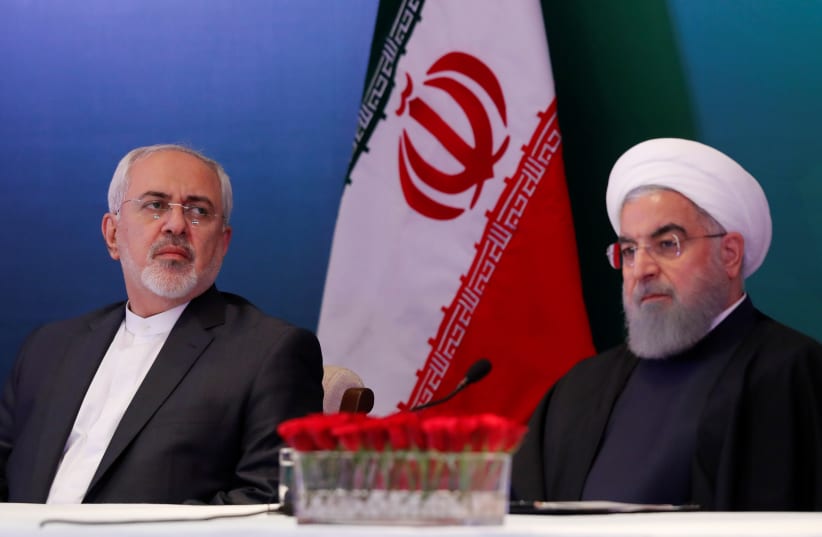Iranian President Hassan Rouhani held back from accepting the resignation of his foreign minister on Tuesday, standing by a moderate ally long targeted by hardliners in internal factional struggles over a 2015 nuclear deal with the West.
The minister, Mohammed Javad Zarif – a US-educated veteran diplomat who helped craft the pact that curbed Iran’s nuclear program in return for sanctions relief – gave no reason for his decision to quit when he announced it on Instagram on Monday.
But his move thrust the schism between Iran’s hardliners and moderates into the open, effectively challenging Supreme Leader Ayatollah Ali Khamenei to pick a side.
An ally of Zarif said his resignation was motivated by criticism of the nuclear accord, under increasingly intense fire in Iran since the United States abandoned it last year.
“There were closed-door meetings every week, where top officials were bombarding him with questions about the deal and what will happen next and so on,” a Zarif ally told Reuters on condition of anonymity. “He and his boss [Rouhani] were under a huge amount of pressure.”
Since the United States walked out of the nuclear deal and reimposed sanctions last year, Rouhani has had to explain why Iran has continued to abide by its restrictions while reaping virtually none of the foreseen economic benefits.
Despite announcing his resignation, Zarif had not officially tendered it to Rouhani by Tuesday afternoon and the president had not accepted it.
Iran’s Foreign Ministry reiterated that Rouhani had not accepted Zarif’s resignation, rejecting reports in the media.
In an apparently related development, an oil ministry spokesman said Oil Minister Bijan Zanganeh is not resigning, according to the Iranian Students’ News Agency (ISNA). Like Zarif, Zanganeh is regarded as a moderate.
“All interpretations and analysis around the reasons behind the resignation of Foreign Minister Mohammad Javad Zarif, beyond what he posted on his Instagram account, are not accurate and, as the chief of staff of the president of Iran said today, the resignation has not been accepted,” spokesman Bahram Qasemi was quoted as saying by Fars news.
Lawmakers representing the majority moderate faction sent Rouhani a letter asking him to keep Zarif on, IRNA reported.
Rouhani’s chief of staff Mahmoud Vaezi said Rouhani stood by Zarif. The president’s praise was “a clear sign of the satisfaction of the representative of the people of Iran about the wise and effective positions and work of Dr. Zarif,” Vaezi wrote on Instagram.
Lawmaker Ali Motahari, like other politicians from both camps, said Rouhani was unlikely to accept Zarif’s decision since no one else could fill the demanding post.
Prime Minister Benjamin Netanyahu didn’t wait for Zarif’s resignation to become official before celebrating his possible exit form the international stage.
“Zarif is gone – good riddance,” he tweeted on Tuesday.
“As long as I’m around, Iran won’t get nuclear weapons,” he added.
Israel’s Ambassador to Germany Jeremy Issacharoff tweeted: “Zarif resignation shows that token moderates in Tehran have no influence and are excluded from any decision making process by hardliners. Congratulations to the Iranian people should be sent once the Khamenei regime and its terror in Iran and beyond, end.”
Zarif’s attempted resignation comes as Netanyahu heads to Moscow. Iran’s military aggression and its attempts to entrench itself along Israel’s border in Syria will be part of Netanyahu’s conversation with Russian President Vladimir Putin.
The schism between hardliners and moderates over the nuclear deal shows the tension in Iran between the two factions, and between the elected government which runs the country on a day-to-day basis and a clerical establishment with ultimate power.
Rouhani won elections in 2013 and 2017 on reform promises, while Khamenei, in power since 1989, is seen as above factional infighting but sympathetic to hardliners. While Rouhani chooses ministers, Khamenei traditionally has the last say.
“If he [Khamenei] publicly backs Zarif and Rouhani, this crisis will be over in a good way and it will narrow the gap between different political camps in the country,” said an official close to the hardline camp.
The political uncertainty comes at a difficult time for Iran’s leaders as the reimposed US sanctions have dashed hopes of an economic breakthrough. Rouhani has warned that the country is facing the worst economic crisis in 40 years.
Hardships have triggered waves of nation-wide protests, with calls for both Rouhani and clerical leaders to step down.
Some unconfirmed Iranian media reports indicated Zarif had resigned because he had not been informed about a visit by Syrian President Bashar Assad on Monday.
Zarif was quoted as condemning “factional fighting” in a newspaper interview published on Tuesday – suggesting political tensions may have played a part in his decision. The Fars news agency reported that the interview had taken place last week, before Zarif’s resignation.
A former pro-reform official warned of dire consequences of Zarif’s resignation is accepted.
“If accepted, it will have a domino effect... and others [ministers] and even Rouhani might follow him and this is not something that the country can tolerate when pressured by America and sanctions,” he said.
“Hardliners will be strengthened and any kind of reform will be buried for at least 10 years.”
Herb Keinon contributed to this report.
